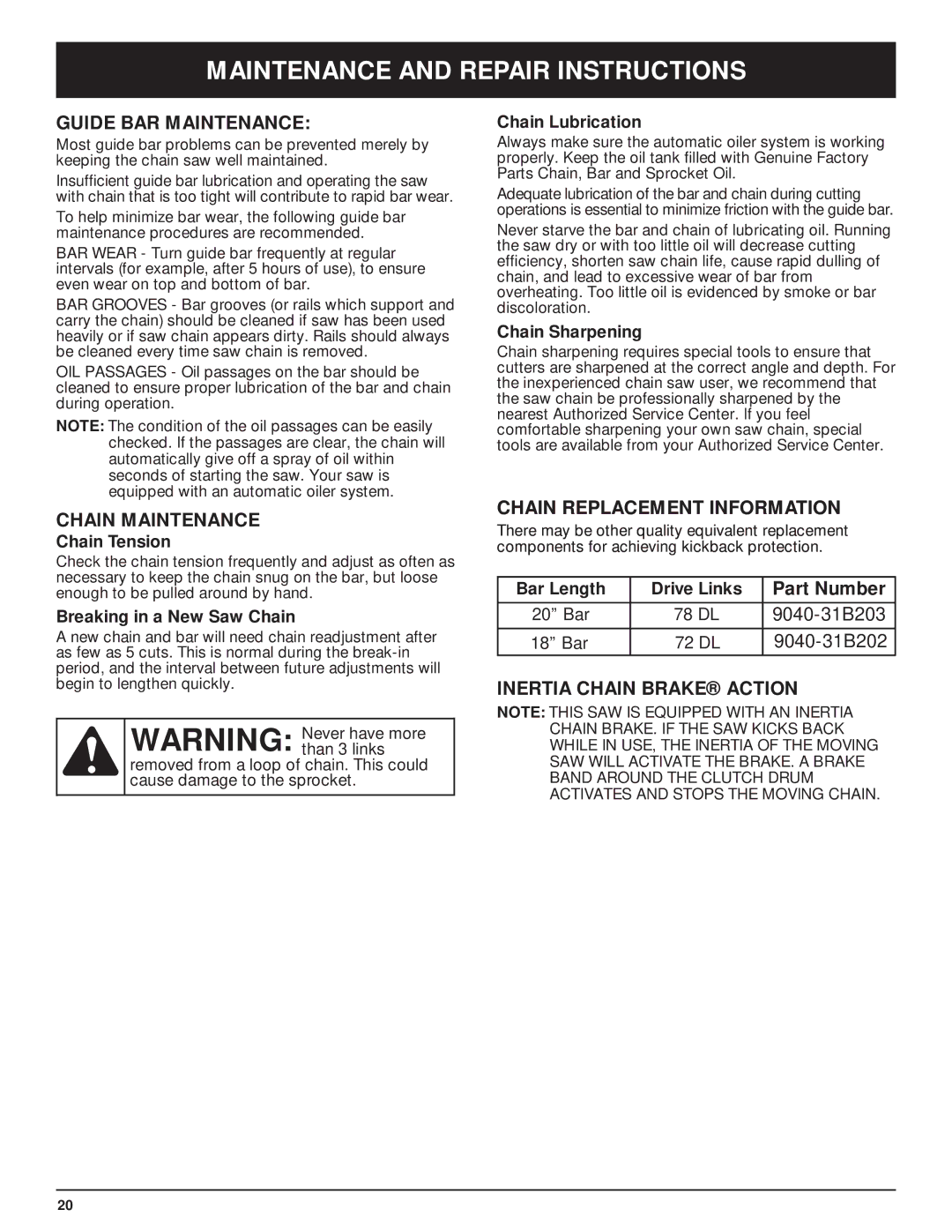
MAINTENANCE AND REPAIR INSTRUCTIONS
GUIDE BAR MAINTENANCE:
Most guide bar problems can be prevented merely by keeping the chain saw well maintained.
Insufficient guide bar lubrication and operating the saw with chain that is too tight will contribute to rapid bar wear.
To help minimize bar wear, the following guide bar maintenance procedures are recommended.
BAR WEAR - Turn guide bar frequently at regular intervals (for example, after 5 hours of use), to ensure even wear on top and bottom of bar.
BAR GROOVES - Bar grooves (or rails which support and carry the chain) should be cleaned if saw has been used heavily or if saw chain appears dirty. Rails should always be cleaned every time saw chain is removed.
OIL PASSAGES - Oil passages on the bar should be cleaned to ensure proper lubrication of the bar and chain during operation.
NOTE: The condition of the oil passages can be easily checked. If the passages are clear, the chain will automatically give off a spray of oil within seconds of starting the saw. Your saw is equipped with an automatic oiler system.
CHAIN MAINTENANCE
Chain Tension
Check the chain tension frequently and adjust as often as necessary to keep the chain snug on the bar, but loose enough to be pulled around by hand.
Breaking in a New Saw Chain
A new chain and bar will need chain readjustment after as few as 5 cuts. This is normal during the
![]()
![]()
![]() WARNING: Never have more than 3 links
WARNING: Never have more than 3 links
removed from a loop of chain. This could cause damage to the sprocket.
Chain Lubrication
Always make sure the automatic oiler system is working properly. Keep the oil tank filled with Genuine Factory Parts Chain, Bar and Sprocket Oil.
Adequate lubrication of the bar and chain during cutting operations is essential to minimize friction with the guide bar.
Never starve the bar and chain of lubricating oil. Running the saw dry or with too little oil will decrease cutting efficiency, shorten saw chain life, cause rapid dulling of chain, and lead to excessive wear of bar from overheating. Too little oil is evidenced by smoke or bar discoloration.
Chain Sharpening
Chain sharpening requires special tools to ensure that cutters are sharpened at the correct angle and depth. For the inexperienced chain saw user, we recommend that the saw chain be professionally sharpened by the nearest Authorized Service Center. If you feel comfortable sharpening your own saw chain, special tools are available from your Authorized Service Center.
CHAIN REPLACEMENT INFORMATION
There may be other quality equivalent replacement components for achieving kickback protection.
Bar Length | Drive Links | Part Number |
|
|
|
20” Bar | 78 DL | |
|
|
|
18” Bar | 72 DL | |
|
|
|
INERTIA CHAIN BRAKE® ACTION
NOTE: THIS SAW IS EQUIPPED WITH AN INERTIA CHAIN BRAKE. IF THE SAW KICKS BACK WHILE IN USE, THE INERTIA OF THE MOVING SAW WILL ACTIVATE THE BRAKE. A BRAKE BAND AROUND THE CLUTCH DRUM ACTIVATES AND STOPS THE MOVING CHAIN.
20
